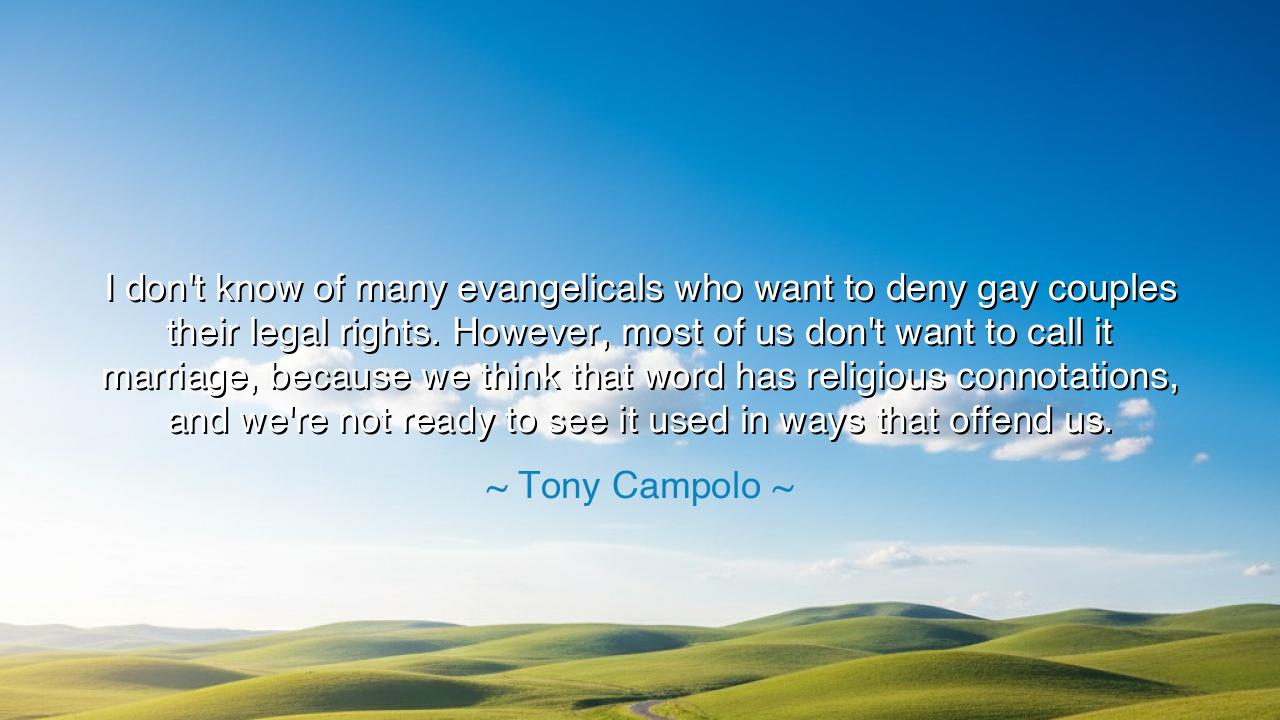
I don't know of many evangelicals who want to deny gay couples
I don't know of many evangelicals who want to deny gay couples their legal rights. However, most of us don't want to call it marriage, because we think that word has religious connotations, and we're not ready to see it used in ways that offend us.






When Tony Campolo declared, “I don't know of many evangelicals who want to deny gay couples their legal rights. However, most of us don't want to call it marriage, because we think that word has religious connotations, and we're not ready to see it used in ways that offend us,” he was not merely commenting on a political debate — he was revealing the deep tension between faith and change, between reverence for tradition and compassion for humanity. His words are the voice of a man standing at the crossroads of conviction and conscience, seeking to preserve belief without extinguishing empathy. Beneath his statement lies an ancient struggle: how can a society honor both the sacredness of its past and the justice demanded by its present?
The origin of this quote lies in the heart of modern religious discourse. Tony Campolo, a respected evangelical leader and sociologist, was known for bridging the gap between Christian orthodoxy and social justice. During a time when debates over gay marriage divided both churches and nations, he sought to express the complexity of the evangelical conscience. His words arose not from hostility, but from hesitation — from the awareness that words carry spiritual weight, and that traditions built over centuries do not change overnight. In speaking so, Campolo gave voice to a generation of believers caught between the love of their faith and the love of their fellow man.
To understand the deeper meaning of this statement, one must first understand the power of language in the sacred realm. For millennia, words such as marriage have carried not merely legal but spiritual significance. In the ancient world, to name something was to consecrate it. The word itself became a vessel of divine meaning. For the devout, then, redefining marriage was not a mere adjustment of civil law — it was a redefinition of a covenant believed to be ordained by God. Thus, Campolo’s reluctance is not rooted in prejudice, but in the fear of sacrilege, in the sense that changing the meaning of a holy term might unravel the spiritual fabric that gives it weight.
And yet, his acknowledgment of legal rights reveals a crucial evolution of thought. He distinguishes between the law of man and the faith of the soul, suggesting that one may affirm equality in society while still preserving sacred boundaries within belief. This distinction is ancient. Even in Rome, Cicero spoke of two laws — the human and the divine — and warned that while both must guide the citizen, they do not always walk the same path. Campolo’s statement echoes this wisdom: the recognition that a just society must protect the rights of all, even as individuals reserve the freedom to hold to their own convictions. In this balance lies the fragile harmony of a pluralistic world.
Consider, too, the historical example of William Wilberforce, a Christian reformer who fought for the abolition of slavery in England. He faced fierce opposition from those who claimed that slavery was sanctioned by Scripture, yet he persisted, guided by the higher moral truth of compassion. Over time, even those who once resisted him came to see that love, not tradition, is the truest measure of faith. Campolo’s words rest on that same precipice — a reminder that religion, if it is to endure, must not become a prison for the heart, but a bridge between holiness and humanity.
His statement is also a reflection of moral discomfort in transition — a recognition that social change is never instantaneous, and that the soul’s acceptance often lags behind the intellect’s understanding. The phrase “we’re not ready” speaks with humility. It admits that even the faithful struggle with fear — fear of loss, fear of offense, fear of the unknown. Yet history teaches that readiness often comes not before change, but through it. When compassion leads the way, understanding follows. Thus, Campolo’s honesty becomes an act of courage — the willingness to speak from the tension of belief rather than the certainty of dogma.
The lesson in this quote is profound: progress and faith need not be enemies, if both are guided by love. One may honor the sanctity of tradition while still extending justice to those beyond it. For the heart of all true religion is not in its words, but in its compassion. The wise must learn to hold their faith firmly, yet their neighbors gently. Laws may define rights, but it is the human spirit that defines dignity. Let Campolo’s words remind us that bridges are built not by those who demand victory, but by those who seek understanding — those who know that the holiest word of all is not marriage, nor law, but love.
And so, to future generations, let this teaching endure: hold to your beliefs, but never let them harden your heart. Speak your truth, but listen for the truth of others. For in the sacred dance between conviction and compassion lies the soul of humanity itself — ever striving, ever growing, ever guided by the quiet light of grace.






AAdministratorAdministrator
Welcome, honored guests. Please leave a comment, we will respond soon